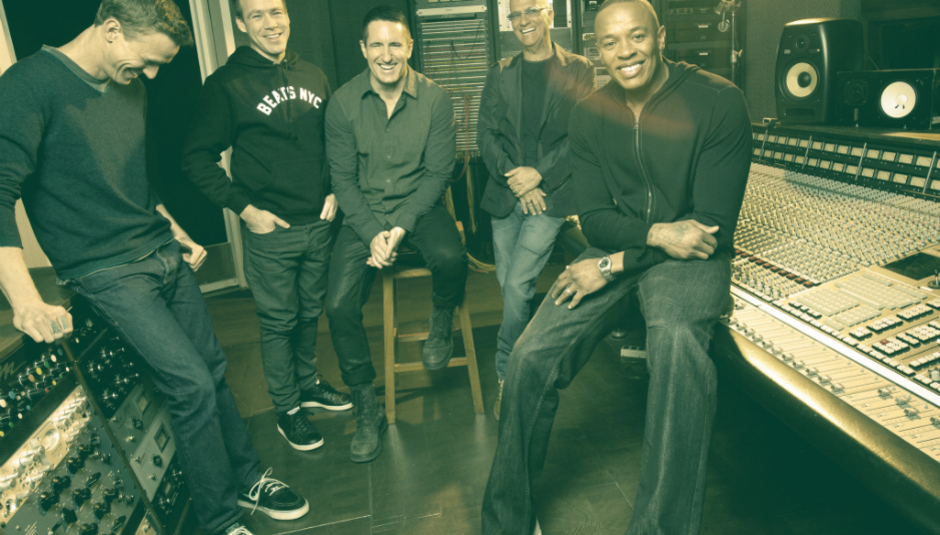Ever since Apple bought Beats Music & Beats Electronics (fka Beats by Dre) for $3bn, the tech press and certain corners of the music press have been beside themselves over the possibility that iTunes might finally become something like a Spotify streaming service.
Following unconfirmed reports that the streaming service is likely to be coming in the next two weeks (sometime during their World Wide Developer Conference - WWDC for short - which takes place from June 8-11th, seems to be what so-called ‘industry insiders’ are suggesting, whereas Sony’s CEO is suggesting it might be later today; it’ll most probably be revealed at 6pm BST on the WWDC live keynote broadcast if that’s the case), it seems that now is the perfect time to compile what we actually know, then wildly speculate about what I hope and predict it might involve.
iTunes: Re-designed, Re-engineered, Re-everythinged
One thing's for certain: The days of the Excel spreadsheet for music are nearly over. iTunes may have revolutionised the music biz but it lacked much in the way of design pizazz. Album art has become teeny and their homepage is crammed full of options to click on. The only real editorial decisions seem to be based on what’s popular (biggest isn't always best....). If you want to learn more about an act or a track or an album, you're listening to you will need to download a PDF attachment or Google to find out who the guest vocalist is... A lot of this cumbersome and oddly rigid design, combined with a locked down backend, explains precisely why Ping - remember that? - failed; it was going to be a social network for music within iTunes...
As a shopping experience, iTunes is quite efficient but dull. It's far more like the front-of-store racks in a high street record store, which is fine if you're the sort of person who buys CDs from supermarkets, but not so much if you're a fan hungry for a music fix. For me, iTunes has always felt really limited in what and how it presents music, which is ironic considering how limitless the options are. It also feels incredibly overwhelming (something social scientists often refer to as choice paralysis), kinda like buying confectionary through a glass window at a petrol station at 4am, when most people decide to get a Mars Bar as it’s the first massively marketed thing they recognise from a distance. Exploring almost all the music ever released shouldn’t be so confined and regimented, and should probably be a little more personalised based on everything you already know and love.
Thankfully, Ian Rogers - who was the man from Topspin who did those Beastie Boys re-issues and worked with Trent Reznor on his direct-to-fan releases - is a key part of the Beats/Apple Music team. He once described iTunes as a spreadsheet for music and it’s quite likely that with Apple’s design gurus, the new look will be far more than a slick re-design. Having seen the original BeatsMusic app, the design looked great, and you got a sense of the humanity (and style) of the people behind the music before clicking play. We're visual animals, so to see music presented with postage stamp imagery and grey text just doesn't seem right.
The habits that Apple's design encourages, and the ability to dive deep into the catalogue will be the challenge they will be trying to solve. Getting the presentation right will be key to separating Apple’s streaming service from the RDIOs, Deezers, and hundreds other fledgling streaming services. For the music business to evolve and for this to be seen as a success, we all need a new generation to fall in love with music. Apple is such a key component in this ecosystem that if they get it right then the next few months could redefine this era.
Believe in Reznor
Nine Inch Nails’ Trent Reznor said in an interview with Billboard that “the right streaming service could solve everybody’s problems.” There are a fair few 'things' these problems include, but based on his previous experiments with pricing and data capture, and launching that Saul Williams record, you’d hope that Reznor knows better than most what Apple needs to solve for both musicians and fans.
They key issues he’s likely to have been kicking people in the shins about are:
Fan retention - there’s absolutely no reason why people should be re-marketing to people who have previously bought or streamed an artist (or who already love them on a social network). So much money is wasted by the music industry trying to ensure that people who love a single buy an album, or people who loved the previous album are even aware there’s a new one. Getting fans on an email database is one thing, but Apple can do far more than that with notifications and even things like syncing your favourite acts with your iCal so that you know when their new record is coming. I’d also love to see some cross pollination between Facebook, Twitter, Tumblr and anywhere else you might already follow an artist, and doing the sort of things for releases that Songkick does for gigs.
Fan acquisition - building a fanbase has never been harder, and I’m sure Trent learnt a lot trying to put Saul Williams, who is hardly a totally unknown act, into the hearts and minds of more music fans. Making it easy for people to sample acts won’t be a challenge, but getting people to support and spread new music needs to be as seamless as possible.
Upgradeable albums - streaming is obviously great for fans, but the money that comes back, especially from ad-supported services, really isn’t that impressive. This is why the likes of Kickstarter and Pledgemusic have flourished, with acts who have a footing trying to ensure they can afford to continue making and touring their music.
Music could learn a lot from CandyCrush and AngryBirds. Allowing fans to stream some of an album, and then upgrade to unlock more would be a sensible step in the right direction. I mean, what about a bass heavier version of an album or all those things Bjork has been doing, which seem lightyears ahead of what everyone else is coming up with. Creating a platform that isn’t confined to listening to albums with a tiny thumbnail of the cover art to gaze at has to be one of the biggest things that artists want - not that anything is ever going to replace reading the sleeve-notes whilst sniffing your dog-eared vinylz, right bro?
More control - the one thing artists love about SoundCloud and YouTube (and loved about MySpace) is that they can make something and upload it instantly to their audience. The distribution barriers were taken away. Allowing some acts to make tracks instantly available and being able to control whether everyone can stream it for forever or just for 24hours could allow artists to feel more in control, but also allow fans to have short-lived moments. Adding in some flexibility for acts who would rather stream their album for one week and then put it on sale to download, or only make it available to premium subscribers, could make for fewer moments like Taylor Swift pulling her entire catalogue. If U2 or Thom Yorke want to give their music away they can do that, but it doesn’t mean everyone has to. The fact that every track, no matter if it’s a tossed off demo or a 43 minute symphony, are given the same value in our time of 1s and 0s, seems somewhat bonkers.
Go Beyond The Stream
Downloads, streams and other such digital detritus is great, but with Apple already having your card details in iTunes and also their new Apple Pay set-up, there are huge possibilities for buying products and tickets and exclusive access. Finding ways of allowing acts to flog merch alongside streams and turning someone who loves your new album into someone who buys the back catalogue to listen to in the car in a lossless format could be the big win for Apple, and for musicians.
Go Beyond the 1%
Dear Apple, please remember that music doesn’t begin with The Beatles and end with Taylor Swift and Sam Smith. We’d like to see people who haven’t sold even 10,000 albums given space each day to wander into people’s worlds.
The Tyranny of the New
Dear Apple, if you’re going to show us music that hasn’t sold 10,000 albums yet, please don’t just make it brand new acts; music has existed since cave men first stomped their feet. Some people have never heard of Carol King or ‘Wichita Lineman’ or dEUS or Deftones or any number of amazing things. Thrill us with nothing but the very best music, not just the hottest, newest, most zeitgeist-humping thing. Sure, some people will care about Ellie Goulding and Calvin Harris having a new song out, and others will want to discover an act like Soak, but if you want people to fork out £100+ a year for music subscription, you really need to go beyond the here and now, and deliver The Classics. Remind people why they love music, rather than trying to get a million people to listen to that godawful new Megan Trainor single about Marvin Gaye.
Netflix for Music
The term “Netflix for music” gets bandied around a lot. No disrespect to Spotify, but this hasn’t happened...yet. Netflix have successfully invested in shows like House of Cards and Orange is the New Black, and turned them into massive success stories. They also managed to grow their business while helping Walter White walk onto our screens on laptops, tablets, phones and “old skool” televisions in ways that no record shop or digital store has ever managed to do for music. It will be fascinating to see whether the rumours are true that Taylor Swift’s label and a few other labels are involved in “commissioning” special releases exclusive to iTunes/Apple Music, before launching these releases onto other “platforms” (i.e. you can watch House of Cards by downloading it from iTunes or stream it on Amazon’s Instant Video). Just imagine some of the records Apple could fund with their billions - as a sort of modern Medici family - without worrying whether the release ever recoups.
Then again, perhaps Apple will not want to own anything or be seen as a competitor to those flooding their marketplace. They have other ‘things’ they can do, and much like they did with boosting Feist’s career with their ad campaign, they will use their might to boost some careers in partnership with their labels (not that they have a great history of paying much or anything for music, despite the millions they’ve made from iPods and whatnot).
Value Curation
Curation could be what kills off the rivals. The New York Post reported that Drake is likely to be paid $19m to DJ on the service, alongside ex-Radio 1 DJ Zane Lowe (and some of his ex-BBC radio producers). If Apple can find a way to support the people who add their expertise to the service, they may also find a whole new way of integrating their service with music both on and off the web. Given that ad-supported websites like ours are struggling, this could be a lifeline to bloggers and broadsheets alike, whilst also enriching their service with the specialism that your local record store clerk has. Filters and the importance of curation is also something Ian Rogers is a big fan of, and intriguingly - but probably unrelatedly - David Byrne wrote a great piece about curation just last week.
I'd love to be able to offer, say 500 of Drowned in Sound's favourite albums for £2.99 a month to stream, or £1 a month to get 2 hours of music compiled by DiS' hive mind, rather than you needing to sign up for £120 a year to get access to all the music ever made. Given the continued success of Now That's What I Call Music compilations, the digital-era hasn't completely eradicated people's desire for, and value of, curation. At the peak of CDs, consumers bought on average six of them a year, which was about £60 being spent on music, yet streaming services expect people to pay double that when all they want is a small selection of things served up to them.
Think Different
Hifis which has a ‘comes-with-music subscription’? Or a simple Sonos-style player that sounds great and makes wireless music makes sense? Beats make stuff, so maybe we’ll finally get some wireless music player that brings great sounding music into almost every household. Then again, the Apple TV has never really taken off. Meanwhile, a lot of music fans are already purchasing the Gramophone to hook their existing sound systems up to their wifi networked devices.
Whatever they end up doing, it will likely be the biggest news story of the year in music.






















